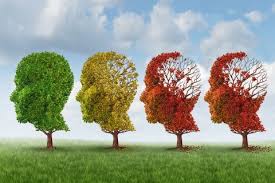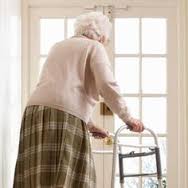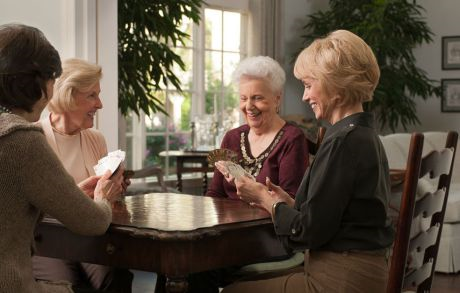Delaying Alzheimers Disease

Delaying Alzheimers Disease can be accomplished through a pro-active approach to a healthy life style. Alzheimers Disease cannot be prevented but there are studies that suggest that Alzheimers and dementia can be delayed. The keyword here is "pro-active". You can't sit in front of the TV all day eating cheetos and expect your life to magically get better or expect to live a long and productive life.
My maternal grandmother was a victim of the Alzheimer disease (AD). My mother took care of her until her death. For several years, she saw the mental deterioration and the child-like, confused and disoriented behavior that the disease can cause. My mother told me many times that she did not want to end her days like that. She had read that crossword puzzles are excellent resources for delaying Alzheimers Disease. So, not surprisingly, she started working puzzles of all kinds and when asked what she wanted for her birthday or Christmas, it was puzzles.
Well, she had one small piece of the "Alzheimer’s puzzle" for delaying Alzheimers Disease worked out as research indicates, but she had left out other important components that research recommends for brain health. To my mother’s disappointment, these were not as easy to engage in as working her puzzles but she at least humored me when I talked to her about them. And now at the age of 83, and with a lot of encouragement, she has engaged all of the following healthy components in her own way and so far it seems to be working because she is still sharp enough to boss me around.
Steps to Delaying Alzheimers Disease
The major components for delaying Alzheimers Disease and dementia are: regular exercise, mental stimulation, quality sleep, stress management, an active social life and a healthy diet. Aren’t these just good elements of daily living that we should all strive for?
Unfortunately, our busy lives don't always allow us to eat right and exercise like we should, which leaves us deficient in essential minerals and vitamins. That vitamin deficiency leads us to have to add these nutrients to our diet through dietary supplements.
One of the surprising findings in research is that there seems to be a link between Alzheimer’s and other diseases such as diabetes and heart disease. So if you can take steps to prevent diabetes and heart disease, you are also preventing or delaying the development of Alzheimer's.
We already know that these six components I mentioned are essential to the maintenance of good heart health and control of diabetes. So, doesn’t it make sense that by applying all six components, you are doing the best you can for delaying Alzheimer's disease and thereby helping yourself and your family? You can’t do anything about the genes you’ve inherited, but you can be proactive in your approach to healthy living choices.
Research has shown that the human brain is able to continually rewire itself and even in old age can grow new neurons. Many experts believe that controlling cardiovascular risk factors may be the most cost-effective and helpful approach to protecting your mental and physical health. There is a mind body connection. The advice we’ve heard many times, “use it or lose it” applies to mind and body.
Dietary Supplements
What About Vitamins and Dietary Supplements?
Can vitamins or dietary supplements protect the brain from Alzheimer’s disease and cognitive decline? One area of research referenced by the National Institutes of Health (NIH) focuses on antioxidants, natural substances that appear to fight damage caused by molecules called free radicals. Other studies are looking at a compound called resveratrol.
Resveratrol, a compound found in red grapes as well as supplements, appears to have properties that may help protect the brain. Observational studies have shown that moderate consumption of red wine is associated with a lower incidence of Alzheimer’s disease, and animal studies have shown that resveratrol can reduce beta-amyloid deposits in the brain. Resveratrol also appears to affect the biological processes of aging-related diseases, including Alzheimer’s. A National Institute on Aging-supported clinical trial will test the effects of resveratrol in people with Alzheimer’s disease.
To order a resveratrol supplement, my suggestion is Raw Resveratrol below. Please click on the photo below which will take you to my Full Script site where you can order it and other products.
A lot of attention is being given to this supplement for its disease fighting powers. There is some research that suggests it might help protect you against Alzheimer's disease by decreasing the plaque build up that develops in our arteries that can then lead to the disease. But, it is important for us to note that although it has disease fighting potential, there is still not enough research to confirm its effectiveness.
Wandering

Unfortunately for some, it is too late and the onset of Alzheimer’s has already taken its irreversible toll. This can be devastating for families, especially the family caregiver who is usually the female head of the household.
One of the scariest situations you can have as a caregiver of a victim of Alzheimer is when you realize that you don't know where your loved one is. There are many heartbreaking stories of people who have eloped, only to be found hours or days later with disastrous results.
But there are products available that can help a caregiver in monitoring the location of their elderly loved one. You can find products online that work with a GPS that allow you to track a loved one with dementia or Alzheimers disease using your smart phone. I will be adding more information and listing more helpful products later in this website, so stay tuned.
Importance of Socialization in Delaying Alzheimers Disease

Most communities have senior centers where seniors go for activities, socialization and in some centers, congregate meals. I can’t stress enough the importance of socialization as one of the components in the menu of a healthy lifestyle and delaying Alzheimers disease or dementia. Studies have shown a correlation between social isolation for the elderly, or for anyone for that matter, and heart disease. There is evidence that having just one person around for emotional support seems to be enough to reduce the risk of heart disease, but having a relationship with multiple individuals provides a healthier effect from a social support system such as what a senior center can provide. This may also explain why people who don’t make the adjustments after the death of a spouse, suffer more maladies and seem to die sooner than expected according to longevity charts.
When I wrote this page, I was Executive Director of a non-residential Community Wellness Center. It was heartwarming to see elderly folks play dominoes or bingo or just participate in an impromptu social gathering. I have no doubt that they were being pro-active in delaying Alzheimers Disease or dementia by participating in at least two components, i.e. mental stimulation, social activity and quite possibly stress management as well. With ages ranging from the 60’s to the 90’s, they also enjoyed a healthy nutritious meal with other folks from the community. Some of those folks participated regularly in Senior-Strength, Senior-Yoga and Senior-Cardio or Tai Chi. These folks are a small sample of the many people of all ages who have chosen a life style conducive to good overall health. I just wish my mother were here to participate as well.
If you are involved in the care-giving of a loved one who is a victim of Alzheimer’s, consider participating in an Alzheimer’s support group. The Alzheimer’s Association has support groups that they endorse and provide training for the facilitators of the meetings. Check with your closest Alzheimer’s Association for the meeting times and location.
For help in finding care for yourself or an elderly loved one, please click on this link, https://www.guide-to-elder-care.com/index.html. The link will take you to my homepage where you can find the elder care that is appropriate for your situation.
I am including a quote from former United States President Ronald Reagan. Here he addresses the American people in announcing his diagnosis of Alzheiemer's. I thought it was very brave and honorable of him to do something so private, but as he explains, it was to help others. Click here to read his quote.
You can help other family caregivers looking for information on delaying Alzheimers disease by sharing your observations and experiences. What are you doing to keep yourself and your family mentally alert and healthy? Please click here to share your story. You do not have to include your full name or any identifying information, but please share your comments .